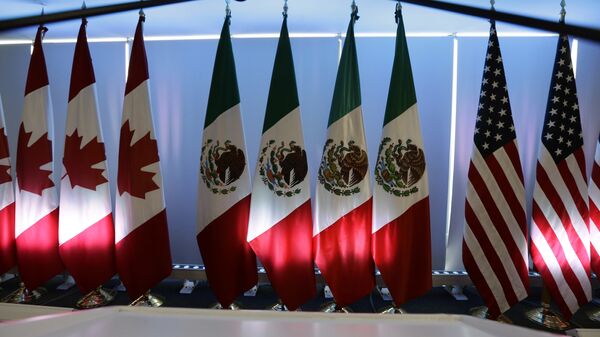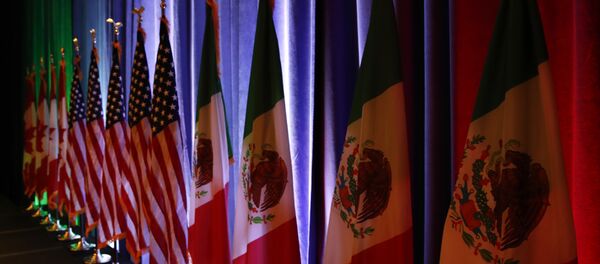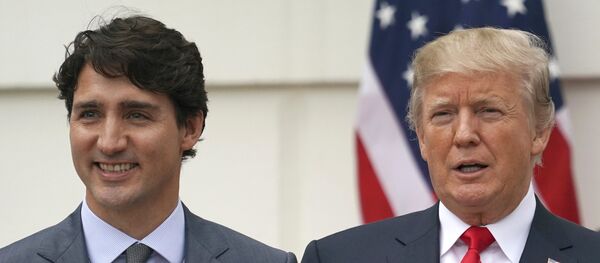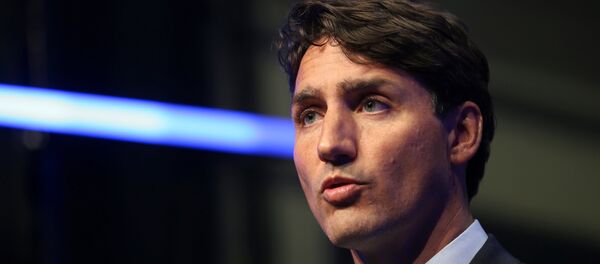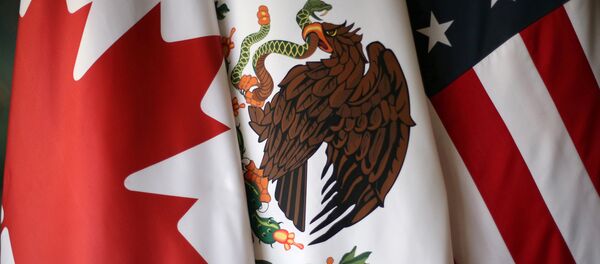Meanwhile, Canadian Prime Minister said that he continues to defend Canada’s supply management in the ongoing efforts to renegotiate the NAFTA agreement adding that Canada will join the US-Mexico agreement as long as it benefits Canada and its middle class. Sputnik discussed the reasons for Canada's willingness to join the talks with Tim Meyer, FedEx Research Professor and Director of the International Legal Studies Program at Vanderbilt University Law School.
Sputnik: Why has Canada agreed to join the talks? What position does it put Canada into?
Tim Meyer: I think the agreement with Mexico was a victory for the Trump administration. I think it’s going to put a lot of pressure on Canada to come to terms with the Trump administration and make some concessions that Canada probably doesn’t want to make.
I think that there’s a little bit of brinksmanship going on and that it is a little bit unclear that the Trump administration actually can go forward with the agreement with Mexico without Canada. But I think when you see (Canadian Foreign Affairs Minister Chrystia) Freeland flying from Europe straight to Washington to meet with the Trump Administration, that indicates that the Trump administration has definitely succeeded in putting some pressure on Canada.
Tim Meyer: I think there’re a few things. I think that the Trump administration has really wanted to open up the Canadian dairy market and Canada has resisted that.
I think we can expect to hear that that is the subject of the negotiations this week. I think that the United States has wanted to revise the investor-state de-settlement system which is a system that allows private citizens and companies from one country to address directly to another country for money.
And we are told that Mexico and the United States have agreed to revise that system and Canada has objected to that; so I think that will be a point in the negotiation.
The third thing is that the US has pushed for a sunset clause the idea of the agreement would automatically cease to be enforced unless the countries agreed to renew it. The US has originally asked for a 5-year sunset, Mexico and the United States have agreed on a 16-year sunset and so it will be interesting to see how Canada reacts to that.
Tim Meyer: I suspect that the dairy issue is probably going to be one of the toughest issues for the Canadians and for farmers and Trudeau to come around on.
Canada relies on dairy and it’s an industry that they’ve sought to protect. Just as the Trump administration has sought to protect and rebuild the steel industry in its trade policies, the Canadians are committed to dairy. I suspect that that would be a difficult issue. I also think that the steel tariffs are likely to feature in any conversations between the United States and the Canadians.
It doesn’t sound like Mexico did anything with the US about steel tariffs in their agreement but I would expect for Canada to push for the US to remove its national security tariffs on steel provided NAFTA.
Tim Meyer: My suspicion is that if the Canadian government is willing to agree to the three terms that the Trump administration really counted coming out of the agreement with Mexico.
The three terms would be the increased contents from 62.5 to 75% of auto, a 16 USD dollar minimum wage for workers on autos and the sunset clause. I suspect that if Canada is willing to agree to those three things and perhaps also the investor-state provision then the Trump administration would be willing to yield on that issue and let the Canadians stick to their position on that.
Sputnik: Regarding the Mexican side, they have said that they really are interested in having a deal with Canada as well; can you talk about what Canada’s position is regarding Mexico and the re-negotiation of these talks? What exactly will be highlighted by Trudeau with regard to the relationship with Mexico?
It’s not clear that President Trump legally has the authority to terminate NAFTA without Congress’s permission and so it’s very possible that if the US were to go forward just with a deal with Mexico, then what we would end up would be a situation where you have NAFTA that’s in effect for all three countries and a deal with respect to the US and Mexico alone unless Congress agrees to pull the US out of NAFTA. And even if the US did pull out of NAFTA there would be nothing to prevent Mexico and Canada from (an agreement) to apply NAFTA as between themselves.
I suspect that the Mexican-Canadian piece of the puzzle is a little bit less complicated. I do think that the fact that Mexicans were willing to negotiate on the side with the US in a way that puts pressure on Canada does indicate that they put a higher value on their relationship with the US than with Canada.
Views and opinions expressed in this article are those of Tim Meyer and do not necessarily reflect those of Sputnik.
